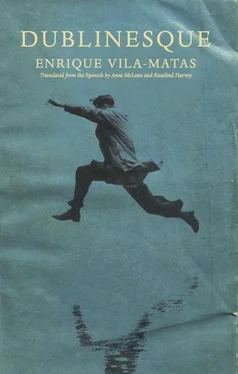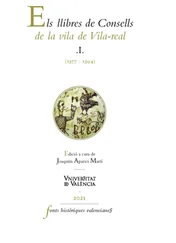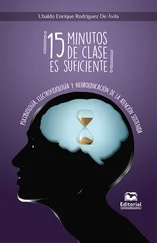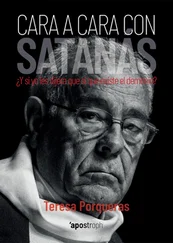Let’s see, thought Riba. If one has the theory, why write the novel? And at the same time as he asked himself this, and doubtless in order to avoid the strong sense of having wasted his time, of wasting it even as he asked the question, he understood that the hours spent in his hotel room writing his theory of the novel had basically allowed him to get rid of it. Wasn’t this contemptible? No, of course not. His theory would still be what it was, lucid and daring, but he was going to destroy it by throwing it into the wastebasket in his room.
He held a secret, private funeral for his theory and for all the theories that had ever existed, and then left the city of Lyon without once having contacted the people who had invited him to speak about the grave — or maybe not so grave, thought Riba throughout the journey — state of literary publishing in Europe. He slipped quietly out of the hotel and took a train back to Barcelona, twenty-four hours after arriving in Lyon. He didn’t even leave a note for the people at Villa Fondebrider justifying his invisibility in Lyon, or his subsequent strange flight. He understood that the whole journey had served only to set out his theory and then hold a private funeral for it. He left totally convinced that his entire theory of what the novel should be was nothing more than a document drawn up with the single aim of liberating himself from its contents. Or, rather, a document with the exclusive aim of confirming that the best thing to do is to travel and to lose theories, lose them all.
“So you’ve been to Lyon,” his mother says, returning to the attack.
It has been a May of changeable weather, amazingly rainy for Barcelona. Today is cold, gray, and sad. For a few minutes, he imagines he’s in New York, in a building where you can hear the traffic driving toward the Holland Tunnel: rivers of cars heading home after work. It’s pure imagination. He has never heard the sound of the Holland Tunnel. He soon returns to reality, to Barcelona and the depressing ash-gray light. Celia, his wife, expects him home around six. Everything is happening with a certain degree of normality, apart from his parents’ growing concern as they realize their son is telling them nothing about Lyon.
But what can he tell them about what happened there? What can he say? That, as they well know, he hasn’t had a drink for two years, since his long-suffering kidneys put him in the hospital, and that this has confined him to a permanent state of sobriety, which means that sometimes he dedicates himself to activities as outlandish as elaborating literary theories and never leaving his hotel room, not even to meet the people who invited him? That in Lyon he didn’t speak to anyone and that, in short, since he stopped publishing, this is what he does every day in the long hours he spends sitting in front of his computer in Barcelona? That what he finds most regrettable and what saddens him most is that he left publishing without having discovered an unknown writer who turned out to be a genius? That he is still traumatized by the misfortune inherent in his former trade, that most bitter misfortune of having to look for authors, those tiresomely essential beings, since without them the whole business would be impossible? That in the past few weeks he has had pains in his right knee, almost certainly caused by uric acid or arthritis, supposing these are two different things? That he was once talkative thanks to alcohol and now he has become melancholy, which was probably always his true natural state? What can he tell his parents? That everything comes to an end?
His visit is going by with a degree of monotony and his parents even resort to recalling, due in part to the tedium dominating this encounter, the now distant day in 1959 when General Eisenhower deigned to visit Spain and ended the international isolation of Franco’s dictatorship. His father spent that day bursting with enthusiasm, not because of the diplomatic battle won by the wretched Galician general, but rather because the United States, the vanquishers of Nazism, had at last approached a moribund Spain. It is one of the first significant memories of Riba’s life. He remembers, above all, the moment his mother asked his father why he was so “excessively enthusiastic” about the American president’s visit.
“What does enthusiastic mean?” Riba had asked his parents.
He will always remember exactly how he framed this question, because — timid as he was at that age — it was the first one he asked. The second question he remembers asking, although he’s not so sure how he framed it. He knows, in any case, that it had to do with his name — Samuel — and with what some teachers and children at school had said to him. His father explained that he was only Jewish on his mother’s side and since she had converted to Catholicism a few months after he was born, he should relax — that’s what he said, relax — and just consider himself the son of Catholics.
Today his father, as on previous occasions when they’ve spoken of Eisenhower’s visit, denies he was so excited, and says it’s a misunderstanding of his mother’s, who thought that he got far too worked up about the American president’s visit. He also denies that for a while his favorite film was Charles Walters’s High Society with Bing Crosby, Grace Kelly, and Frank Sinatra. They watched it at least three times, at the end of the fifties, and Riba remembers this film always used to put his father in an excellent mood. He was crazy about everything that came from the United States; the films and the glamour fascinated him; he was drawn to the lives led by human beings who were like them but in a place that seemed as remote as it was inaccessible. And it’s very likely Riba inherited from him, from his father, his fascination with the New World, the distant charm of those places that, back then, seemed so unattainable, maybe because the people who lived there seemed like the happiest people on earth.
They talk about Eisenhower’s visit and High Society and the D-Day landings, but his father continues stubbornly to deny he felt such enthusiasm. Just when it seems as if, to avoid getting stuck on the subject, his parents will soon return to the Lyon question, night falls on Barcelona with unusual speed; it grows dark very quickly, and a violent downpour arrives with a big flash of lightning. It falls just at the moment he is getting ready to leave the house.
The dreadful crash of a solitary clap of thunder. The rain falls on Barcelona with a rage and force never before seen. Suddenly he has the feeling of being trapped and at the same time of being perfectly capable of walking through walls. Somewhere, at the edge of one of his thoughts, he discovers a darkness that chills him to the bone. He isn’t too surprised, he’s used to this happening to him in his parents’ apartment. The most likely explanation is that, a few moments ago, one of the numerous damp ghosts — peaceful ghosts of some ancestor or other who inhabit this dark mezzanine — has slipped inside him.
He wants to forget about the domestic specter chilling him to the bone, so he goes over to the window and there he sees a young man who, with no umbrella in the rain, standing right in the middle of Calle Aribau, seems to be spying on the house. He is perhaps a superior ghost. But in any case, the young man is without a doubt a phantom from outside, not one of the family. Riba exchanges a few glances with him. The young man has an Indian-looking face, and wears an electric-blue Nehru jacket with gold buttons down the front. What can he be doing out there and why is he dressed like that? When the strange young man sees that the traffic lights have changed and the cars are starting to move along the street again, he crosses to the other side. Is it really a Nehru jacket he’s wearing? It could just be some kind of fashionable jacket, but it’s not at all clear. Only someone like Riba, who has always been such an attentive reader of newspapers and is now of a respectable age, would remember people such as Srî Pandit Jawâharlâl Nehru, a politician from another age, the Indian leader who was spoken of so much forty years ago, and now not at all.
Читать дальше












